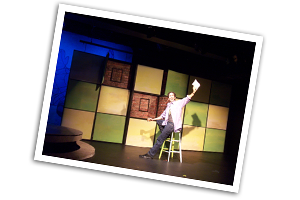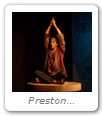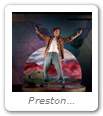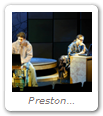Hate Mail by Bill Corbett and Kira Obolensky

Act II Playhouse
November 13 - December 9, 2007
General Beauty | Program Letter | Photos
Sets: Melissa Guyer
Costumes: Jessica Risser-Milne
Lights: James Leitner
Sound: Matthew Aaron
Stage Manager: Margie Price
Cast (in alphabetical order): Damon Bonetti and Charlotte Northeast
This production was partially inspired by the work of pop-up artist, Robert Sabuda.
[top]
General Beauty
Hate Mail is about the whirlwind, laundry-drying tossing to and fro that it is to be a human being. The beauty comes by taking these private moments of our souls - what we share out of hate or love for those nearest to us - and tracks the journey of those moments in intricate detail. These two people are capable of such extremes, such huge shifts in lifestyles, opinions, feelings, choices, habitats, likes, dislikes, living arrangements, etc. To be a human being is an amazing thing, a huge thing, a wide, disparate thing. It is to be capable of so much - good and bad. Preston and Dahlia are so fascinating, so screwed up, so vulnerable, so raw, such bundled heap of nerve and humanity. The play combines watching a car wreck with the better angels of our nature. We all know these feelings. We all have had these experiences. The play compresses these feelings, these experiences - magnifies them to an extreme, for an unforgettable roller coaster trip on the ride of “being alive.” We are ashamed at recognizing our own pettiness and brutality as reflected in Preston and Dahlia’s actions, but also have hope that, like Preston and Dahlia, we can be redeemed in the end. That we haven’t pissed away our one shot at love. In the end, the better angels of our nature win out. We grow, we prosper. We aren’t left alone.
[top]
Program Letter
This is a comedy.
I put that out there because some of the things you’re about to read might make you wonder. For instance - Abraham Lincoln. What the heck does Abe Lincoln have to do with comedy and, more specifically, with this play? We’ll get to that.
Back to comedy. This play should make you laugh. A lot. But comedies are rarely just about laughter. Comedies ultimately should reveal just as much about the human condition as something like Hamlet.
I know, I know, I’m using the phrase “human condition” and referencing Hamlet. “This play is supposed to be funny,” you’re thinking. “How come the director is trying to channel Ingmar Bergman?” And I thought that, too. This is a silly play where two bizarre characters do ridiculous things and go to the strangest places all in the name of love (and hate). Am I pushing to try to make this reveal something about the dreaded “human condition”?
Then I got this email from an old high school friend (a girl, by the way, with whom I first read Love Letters - the play that inspired this one) and I suddenly realized this play isn’t that far removed from real life after all:
“After graduating from nine weeks of intense Bikram yoga boot camp....I attempted to readjust to normal life...I decided heck with normal...Here I am in Tel Aviv...I will teach my first yoga class this Saturday...”
It hit me that the laughter in the play is the cringing laughter of recognition. We’ve all done bizarre, ridiculous things in the name of love/hate. Maybe not quite as bizarre as what Preston and Dahlia do, but close enough to make us cover our eyes in shame and yet still peak through our fingers to root for the characters.
We root for them to say those outrageous things we always wished we had said; and we root for them to find their happiness a little quicker than it took us to find it.
And this is when Abe Lincoln came to mind. The phrase “the better angels of our nature” kept bouncing around in my head. Itís from the end of Lincoln’s first inaugural address. (Google the final paragraph after seeing the show!) That phrase, to me, captured the hope and beauty of the play. We all hope that in spite of our foibles and oddities, those “better angels of our nature” will at last prevail and take us to a place of happiness, contentment, and (gulp) love.
This play, in its own silly little way, shows us that we are not absurd to hope. And, oh yeah, it should also make you laugh.
I hope you enjoy it.
[top]






